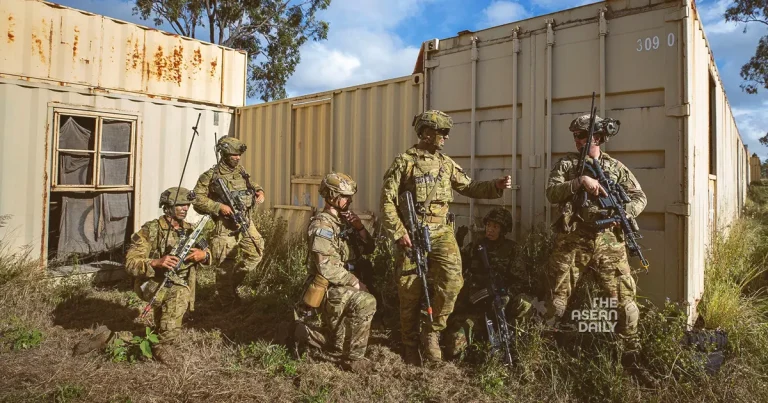5-6-2024 (SYDNEY) In a bid to address a severe shortage of military personnel, Australia has announced plans to allow foreign permanent residents (PRs) to join its armed forces. However, the scheme will initially be limited to those hailing from New Zealand, the US, the UK, and Canada – the country’s intelligence allies.
The federal government revealed on June 4 that foreigners who receive security clearances and have resided in Australia for at least 12 months will be eligible to enlist. Applicants must not have served in a foreign military in the preceding two years and must be able to attain Australian citizenship. Enlistments will commence with nationals from Australia’s Five Eyes intelligence partners, but the scheme could potentially be expanded to other nations like Singapore if successful.
This move comes as Australia desperately tries to boost its personnel numbers. The latest federal budget, released on May 14, revealed that the military is expected to grow by just 358 people in 2024 to 58,600, about 5,000 fewer than its targeted level. The government aims to increase troop numbers to 80,000 by 2040.
Minister for Defence Personnel Matthew Keogh stated on June 4 that the shortage of personnel was a “deep concern” and that the plan to recruit non-citizens would bring in about 350 more people annually. Those who join will be eligible to apply for citizenship after serving 90 days.
“We’re being bold in order to grow the Australian Defence Force (ADF),” Mr Keogh said in a statement. “Recruiting from a wider pool of people will help ensure our (ADF) reflects the full diversity of Australia and is able to draw on the talents of the entirety of Australian society.”
In recent years, Australia has embarked on ambitious projects to expand its military capability, including acquiring nuclear-powered submarines and a new class of frigates. However, concerns are mounting about the capacity to attract enough recruits to operate these acquisitions, despite Australia’s relatively high-paying military.
Defence analysts welcomed the move to recruit foreign nationals, noting that Australia has not had conscription since the early 1970s during the Vietnam War and has long struggled to persuade its citizens to enlist.
Neil James, executive director of the Australia Defence Association, told The Straits Times that Australia’s military has extensive experience allowing foreign nationals to serve, such as citizens of Commonwealth countries who could enlist until the 1970s. Recruiting permanent residents “makes eminent sense”, he said.
“We have always had people serving from countries whose militaries are similar to ours.”
The new scheme will start with New Zealanders, who will be able to join the Australian military from July 1. Citizens from Canada, the United Kingdom, and the United States will be able to enlist from January 2025. The scheme is expected to be extended to Pacific nations in 2025 and then to other countries.
Luke Townsend, an analyst who has served in both the Australian and British militaries, called the recruitment plan a “good idea”. He added that the Australian military is currently too small to have sufficient capabilities to deter potential adversaries.
“I think this plan will help with our modest recruitment goals, but I don’t think it addresses what is wrong,” said Mr Townsend, now managing director at defence robotics firm Outlook Industries. “We don’t have any deterrent capability.”
He said the military has struggled to recruit Australians, noting that many of those who enlist are following in the footsteps of family members who have served. “For many Australians, the military is outside their lived experience,” he said.
The government has introduced other schemes to boost the military’s numbers, including A$50,000 bonuses to those who agree to serve an additional three years after completing an agreed period of service. Health and fitness requirements for enlisting personnel have also been eased.
Initially, Mr Keogh said citizens from all other countries would be able to join the military. However, this quickly led to questions about whether the military would accept residents from China, which has strained ties with Australia and is viewed as a major source of espionage.
Defence Minister Richard Marles later clarified in Parliament that the scheme was limited to Five Eyes members. He signalled that citizens from other countries may eventually be able to enlist but did not give a timeline, saying, “It’s (a) significant crossing of the Rubicon today, but we’re doing it in a pretty limited way.”
Mr James said citizens from countries like China and Russia would be unlikely to get security clearance because Australian authorities would find it hard to check their backgrounds. However, he said Australia was likely to be open to Singaporeans enlisting, stating, “The Singaporeans work fairly close with us. There is a fair amount of trust with Singapore.”




